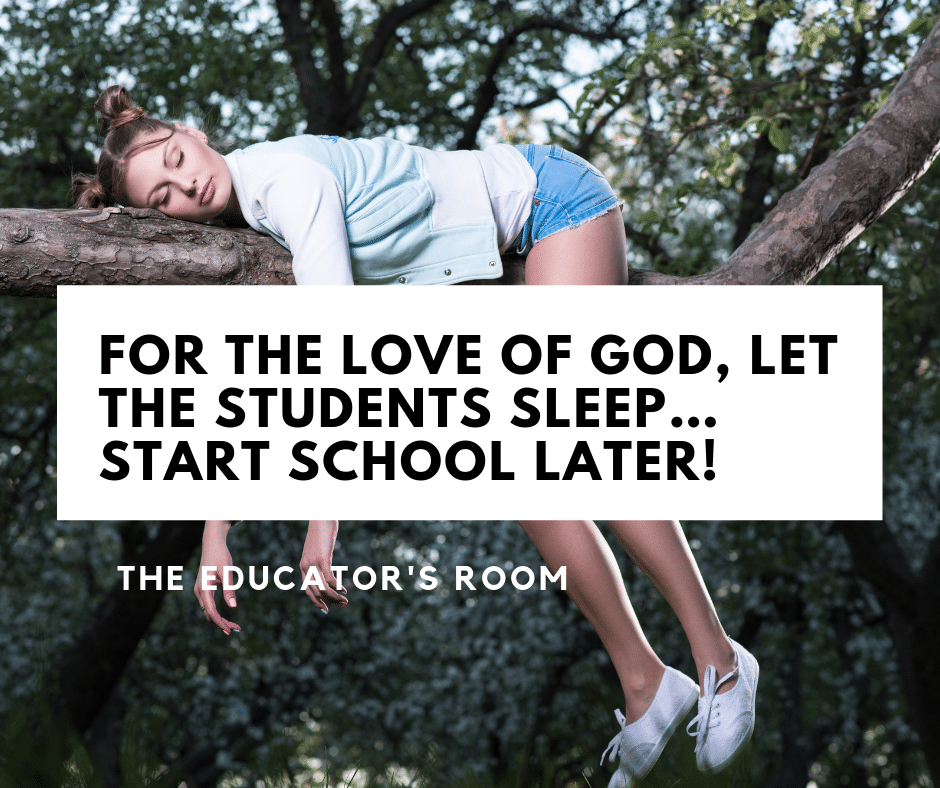There are many aspects adults can agree on about teenagers. The most crucial acknowledgment is that they are a tired group. The research, the data, and the science all confirm that sleep matters. Bottom line: we need to start schools later — no earlier than 8:30 am.
The AMA, AAP, and the CDC agree with the benefits of later school times. These health organizations cite many benefits to wellness including weight control, mood quality, motivation, less risk-taking behaviors, etc. A Washington Post article reported that the RAND Corporation’s research demonstrates another positive to later school times: an economic benefit! In his article, “Letting teens sleep in would save the country roughly $9 billion a year.”Christopher Ingraham writes:
The economic benefits would come primarily from two sources: greater academic performance (and hence, lifetime earnings) among more well-rested students and reduced rates of car crashes among sleepy adolescent drivers.
Key findings from the Rand Corporation’s research:
The study suggested that delaying school start times to 8:30 a.m. is a cost-effective, population-level strategy which could have a significant impact on public health and the U.S. economy. The study suggested that the benefits of later start times far out-weigh the immediate costs. Even after just two years, the study projects an economic gain of $8.6 billion to the U.S. economy, which would already outweigh the costs per student from delaying school start times to 8:30 a.m.After a decade, the study showed that delaying schools start times would contribute $83 billion to the U.S. economy, with this increasing to $140 billion after 15 years. During the 15 year period examined by the study, the average annual gain to the U.S. economy would about $9.3 billion each year. Throughout the study’s cost-benefit projections, a conservative approach was undertaken which did not include other effects from insufficient sleep, such as higher suicide rates, increased obesity, and mental health issues — all of which are difficult to quantify precisely. Therefore, it is likely that the reported economic benefits from delaying school start times could be even higher across many U.S. states.
Furthermore, the RAND Corporation predicts that later school start times would benefit the economy in just two short years! Yes, they do take into consideration the costs of more buses, bus drivers, and increased lighting of athletic fields. However, they cite the cost-benefit analysis in the positive direction.
Many teachers have been investigating the issue of sleep recently. Teachers in the Liverpool Central School District, north of Syracuse, NY, took on sleep for a leadership project. In the following video, they make a compelling case by presenting the science of sleep: Start With Sleep Part I: The Science.
When I tell adults the time I awaken (5:15 a.m.), they cringe. Sure I have a self-imposed 3o minute commute, but my middle-school-aged daughters are also up by 5:30 a.m.
My children begin their days at 5:30 a.m., followed by classes from 8:00 a.m. to 2:25 p.m., a quick return home for a snack and homework, a mad dash to swim practice from 4:30–6 p.m., and then dinner, chores, and bed by 9:00 p.m. every night. Students have busy schedules.
Although our oldest, an eighth-grader, has a long day of school and strenuous athletics, biology keeps her up. She is not allowed devices in her bedroom, but she will often remain awake due to her internal clock. The sleep deprivation has a cumulative effect. She will grow more tired and she will be less able to fall asleep before 11:00 p.m. It frustrates her because she recognizes her need for more sleep, but it will be out of her control. She will be like other adolescents, tired.
The students that I teach begin their day at 7:40 a.m. Many arrive in the building by 7:10 a.m. Most catch their bus between 6:30 and 7:00 a.m. What do they forfeit the most besides sleep? Breakfast. The district offers free breakfast for all students, but many students lament that they are just not that hungry at that early hour.
Again, the teachers involved in the leadership project at Liverpool Central Schools demonstrate the reality for Liverpool adolescents, and teenagers across the United States in this video: Start with Sleep (Part 2 – Our students’ reality).
I live and teach in snowy Central New York. Some of my most productive days have been on a two-hour delay schedule. When the day begins at 9:45 a.m., the classes are shorter, stuff gets done; everyone is more alert. Now, 9:45 a.m. is probably too late to begin school regularly, but those delay days demonstrate an alternative reality that is both productive and healthy.
I know what some of you are thinking: adolescents need to toughen up. They will not choose their work schedule. In the real world, no one will coddle them. They need to get off their devices and go to sleep. They are going to be sleepy no matter the start time.
Hogwash.
The research supports the benefits of later school start times. If you want to continue to deny science (like Climate Change), go ahead, but don’t complain about those “teenagers,” while placing a huge biological obstacle in their way.
My colleagues at Liverpool Central Schools present counter-arguments to the nay-sayers while offering real-world solutions in this video: Start with Sleep Part 4: Roadblocks and Risks.






I run after school activities and my day is very long.
I support this 100%. If I get to sleep a little later, I will be a better teacher, just like my students will be better learners. First hour is often a wasted hour because no one is fully awake or able to focus. By the end of after school activities, everyone is too exhausted to function.